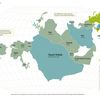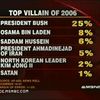Iran and Japan have taken another step in making the dollar's dominance a thing of the past.
Japanese oil refiners Cosmo Oil Co. and Japan Energy Corp. have started paying for Iranian crude oil in yen instead of dollars, announced company spokesmen on October 9. Both companies are following in the footsteps of Nippon Oil Corp.-Japan's largest oil refiner-which made the same announcement in September.
How significant is it that more and more nations are ceasing to use the dollar as a reserve currency?
Since the 1944 Bretton Woods Agreement, the US dollar has been the world's primary reserve currency. This has been especially true regarding the crude oil trade, in which the majority of nations pay for crude oil in dollars. The resulting massive demand for dollars has allowed the United States to accumulate trade deficits and fiscal debts without experiencing the negative economic impacts that such imbalances normally cause.
This past July, the National Iranian Oil Company (NIOC) general manager of crude oil marketing and exports, Ali Arshi, sent a letter to Japanese oil refineries requesting that all future crude oil shipments be paid for in yen. Three major Japanese oil refiners have already complied. Will other Asian oil refiners follow suit and move away from the US dollar?
As the largest overseas holder of US treasuries, Japan is a key supporter of the US dollar. Yet Iran is the third-largest supplier of Japanese oil. As one Tokyo investment securities analyst said, "What else can Japan do but accept the [Iranian] request, once the oil producer sent its wish?"
The switch to yen should have little negative impact on the Japanese economy. As the purchasing power of the dollar has decreased, the price of oil has skyrocketed to $80 a barrel. Any increase in value of the yen, due to increased oil-yen demand, will only make oil imports less expensive for a nation that is highly dependent on oil imports.
The Iranians are also optimistic about the switch. Hojjatollah Ghanimifard, the International Affairs Director of NIOC, stated that "With the arrangements we've made with our Asian customers, hopefully by the end of October we will have around 80 percent of our export revenues in currencies other than the dollar."
Already, approximately 65 percent of Iran's crude oil exports are based on the euro and another 20 percent on the yen. Iran is casting off the dollar and doing all it can to persuade the oil refineries of Japan to do the same.
Central banks in South Korea, China, Taiwan, Russia, Syria and Italy have announced plans to reduce their dollar holdings. As nations and corporations turn their back on the greenback, the decreasing demand for America's currency may cause its already weakening value to plunge to new depths.
17.10.2007
http://english.pravda.ru/business/companies/17-10-2007/98974-reserve_currency-0
Um bloggiš
Baldur Fjölnisson
Nżjustu fęrslur
- Torfi Stefįns bannašur ęvilangt
- OL ķ skįk. Landinn malaši Kenķu ķ 9. umferš
- OL ķ skįk: Landinn ķ 88. sęti eftir 8 umferšir
- Mešaljónar ķ skįkinni
- Baggalśtur - Sagan af Jesśsi
- Eitraš fyrir lżšnum?
- Óvenjulega döpur taflmennska innfęddra einkennir Reyjavķkursk...
- U.S. Rushes Coolant to Japanese Nuke Plant After Earthquake
Heimsóknir
Flettingar
- Ķ dag (16.9.): 0
- Sl. sólarhring: 2
- Sl. viku: 7
- Frį upphafi: 0
Annaš
- Innlit ķ dag: 0
- Innlit sl. viku: 6
- Gestir ķ dag: 0
- IP-tölur ķ dag: 0
Uppfęrt į 3 mķn. fresti.
Skżringar
Bloggvinir
-
 Agný
Agný
-
 Alfreð Símonarson
Alfreð Símonarson
-
 Andrea J. Ólafsdóttir
Andrea J. Ólafsdóttir
-
 Bjarni Harðarson
Bjarni Harðarson
-
 Bjarni Kjartansson
Bjarni Kjartansson
-
 Björgvin Gunnarsson
Björgvin Gunnarsson
-
 Brynjar Jóhannsson
Brynjar Jóhannsson
-
 FLÓTTAMAÐURINN
FLÓTTAMAÐURINN
-
 Eygló Þóra Harðardóttir
Eygló Þóra Harðardóttir
-
 FreedomFries
FreedomFries
-
 Fríða Eyland
Fríða Eyland
-
 Félag um stafrænt frelsi á Íslandi
Félag um stafrænt frelsi á Íslandi
-
 Georg P Sveinbjörnsson
Georg P Sveinbjörnsson
-
 Gestur Guðjónsson
Gestur Guðjónsson
-
 Gils N. Eggerz
Gils N. Eggerz
-
 Gullvagninn
Gullvagninn
-
 Gunnar Skúli Ármannsson
Gunnar Skúli Ármannsson
-
 Guðrún María Óskarsdóttir.
Guðrún María Óskarsdóttir.
-
 Gísli Hjálmar
Gísli Hjálmar
-
 Hagbarður
Hagbarður
-
 Halla Rut
Halla Rut
-
 Haraldur Haraldsson
Haraldur Haraldsson
-
 Hilmar Kári Hallbjörnsson
Hilmar Kári Hallbjörnsson
-
 Hlekkur
Hlekkur
-
 Ingibjörg Álfrós Björnsdóttir
Ingibjörg Álfrós Björnsdóttir
-
 Jens Guð
Jens Guð
-
 Jóhannes Ragnarsson
Jóhannes Ragnarsson
-
 Jón Aðalsteinn Jónsson
Jón Aðalsteinn Jónsson
-
 Jón Ragnarsson
Jón Ragnarsson
-
 Jón Steinar Ragnarsson
Jón Steinar Ragnarsson
-
 Jónína Benediktsdóttir
Jónína Benediktsdóttir
-
 Karl Tómasson
Karl Tómasson
-
 Kári Magnússon
Kári Magnússon
-
 Loopman
Loopman
-
 Magnús Þór Hafsteinsson
Magnús Þór Hafsteinsson
-
 Promotor Fidei
Promotor Fidei
-
 Rúnar Sveinbjörnsson
Rúnar Sveinbjörnsson
-
 Salvör Kristjana Gissurardóttir
Salvör Kristjana Gissurardóttir
-
 Sandra María Sigurðardóttir
Sandra María Sigurðardóttir
-
 SeeingRed
SeeingRed
-
 Sigurbjörn Friðriksson
Sigurbjörn Friðriksson
-
 Sigurjón Þórðarson
Sigurjón Þórðarson
-
 Sigurður Þórðarson
Sigurður Þórðarson
-
 Snorri Hrafn Guðmundsson
Snorri Hrafn Guðmundsson
-
 el-Toro
el-Toro
-
 Sveinn Ingi Lýðsson
Sveinn Ingi Lýðsson
-
 Tryggvi Hjaltason
Tryggvi Hjaltason
-
 TómasHa
TómasHa
-
 Túrilla
Túrilla
-
 Upprétti Apinn
Upprétti Apinn
-
 gudni.is
gudni.is
-
 haraldurhar
haraldurhar
-
 proletariat
proletariat
-
 Ívar Pálsson
Ívar Pálsson
-
 Ómar Ragnarsson
Ómar Ragnarsson
-
 Ónefnd
Ónefnd
-
 Óskar
Óskar
-
 Óskar Helgi Helgason
Óskar Helgi Helgason
-
 Óskar Þ. G. Eiríksson
Óskar Þ. G. Eiríksson
-
 Þórir Kjartansson
Þórir Kjartansson
-
 Arnar Guðmundsson
Arnar Guðmundsson
-
 Bara Steini
Bara Steini
-
 Birgir R.
Birgir R.
-
 Birgir Rúnar Sæmundsson
Birgir Rúnar Sæmundsson
-
 brahim
brahim
-
 Brosveitan - Pétur Reynisson
Brosveitan - Pétur Reynisson
-
 Bwahahaha...
Bwahahaha...
-
 Dingli
Dingli
-
 eysi
eysi
-
 Gestur Kristmundsson
Gestur Kristmundsson
-
 Guðbjörg Elín Heiðarsdóttir
Guðbjörg Elín Heiðarsdóttir
-
 Gunnar Helgi Eysteinsson
Gunnar Helgi Eysteinsson
-
 Gunnar Rögnvaldsson
Gunnar Rögnvaldsson
-
 Helgi Jóhann Hauksson
Helgi Jóhann Hauksson
-
 Hlini Melsteð Jóngeirsson
Hlini Melsteð Jóngeirsson
-
 Jakobína Ingunn Ólafsdóttir
Jakobína Ingunn Ólafsdóttir
-
 Katrín Snæhólm Baldursdóttir
Katrín Snæhólm Baldursdóttir
-
 kreppukallinn
kreppukallinn
-
 Kristín Magdalena Ágústsdóttir
Kristín Magdalena Ágústsdóttir
-
 Máni Ragnar Svansson
Máni Ragnar Svansson
-
 Morgunblaðið
Morgunblaðið
-
 Neo
Neo
-
 Orgar
Orgar
-
 Ragnar L Benediktsson
Ragnar L Benediktsson
-
 Rauði Oktober
Rauði Oktober
-
 Skákfélagið Goðinn
Skákfélagið Goðinn
-
 Sveinn Þór Hrafnsson
Sveinn Þór Hrafnsson
-
 Vilhjálmur Árnason
Vilhjálmur Árnason
-
 Þór Ludwig Stiefel TORA
Þór Ludwig Stiefel TORA




Bęta viš athugasemd [Innskrįning]
Ekki er lengur hęgt aš skrifa athugasemdir viš fęrsluna, žar sem tķmamörk į athugasemdir eru lišin.